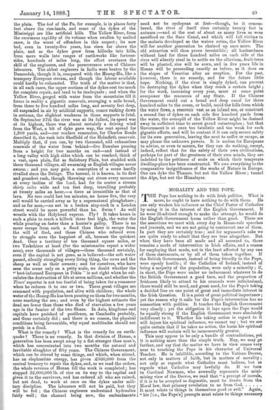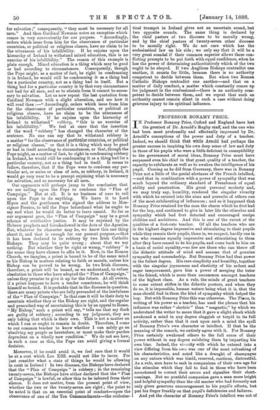MORALITY AND THE POPE.
THE Pope has nothing to do with Irish politics. What is more, he ought to have nothing to do with them. He can only weaken his influence as the Chief Pastor of Catholics by using it in the interest of the English Government. If he were ill-advised enough to make the attempt, he would do the English Government harm rather than good. These are the assertions we meet with every day in Home-rule speeches and journals, and we are not going to controvert one of them. In part they are certainly true ; and for argument's sake we are quite ready to admit that they are true altogether. Bat when they have been all made and all assented to, there remains a mode of intervention in Irish affairs, and a reason for employing that mode, not in the least affected by any one of these statements, or by all of them taken together. If the British Government, instead of being friendly to the Pope, were openly hostile ; if the Catholics of Ireland, instead of being a majority of the population, were only a minority ; if, in short, the Pope were under no inducement whatever to do the British Government a good turn, and the proportion of Irishmen likely to attend to his counsels were infinitesimal, there would still be need, and great need, for the Pope's taking a decided line on one point of great and immediate interest in the Irish Question. It is a point of great political importance ; yet the reason why it calls for the Pope's intervention has no connection with politics. It touches the English Government very closely ; yet the obligation it lays upon the Pope would be equally strong if the English Government were absolutely indifferent to it. Whether his taking action in regard to it will injure his spiritual influence, we cannot say ; but we are quite certain that if he takes no action, the harm his spiritual influence will sustain will be immeasurably greater.
This may appear to be only a bundle of contradictions, yet it is nothing more than the simple truth. Nay, we may go further, and say that the matter we have in view comes very near to touching the Pope in his character of Universal Teacher. He is infallible, according to the Vatican Decree, not only in matters of faith, but in matters of morality ; not only as regards what Catholics must believe, but as regards what Catholics may lawfully do. If we turn to Cardinal Newman, who avowedly represents the mini- mising view of the Decree, we read that "a precept of morals, if it is to be accepted as dogmatic, must be drawn from the Moral law, that primary revelation to us from God It must relate to things in themselves good or evil." Again, "his 1-i.e., the Pope's] precepts must relate to things necessary
for salvation ;" consequently, "they must be necessary for all men." And then Cardinal Newman notes an exception which comes in very conveniently for our purpose. "Accordingly, orders which issue from him for the observance of particular countries, or political or religious classes, have no claim to be the utterances of his infallibility. If he enjoins upon the hierarchy of Ireland to withstand mixed education, this is no exercise of his infallibility." The reason of this example is plain enough. Mixed education is a thing which may be good or bad according to circumstances. Consequently, though the Pope might, as a matter of fact, be right in condemning it in Ireland, he would still be condemning it as a thing bad for a particular country, not as a thing bad in itself. But a thing bad for a particular country is by that very circumstance not bad for all men, and so to abstain from it cannot be neces- sary to salvation. Let us now repeat the last quotation from Cardinal Newman with a slight alteration, and see how it will read then :—" Accordingly, orders which issue from him for the observance of particular countries, or political or religious classes, have no claim to be the utterances of his infallibility, if he enjoins upon the hierarchy of Ireland to withstand" robbery, "this is no exercise of
his infallibility." We feel at once that the insertion of the word " robbery " has changed the character of the sentence. No one can say that to withstand robbery is a matter " for the observance of particular countries, or political or religious classes," or that it is a thing which may be good or bad in itself according to circumstances, or that, though the Pope might, as a matter of fact, be right in condemning robbery in Ireland, he would still be condemning it as a thing bad for a particular country, not as a thing bad in itself. It seems to follow, therefore, that if the Pope were to condemn any par- ticular act, or series or class of acts, as robbery, in Ireland, it would go very near to be a precept enjoining what is necessary for salvation, and so necessary for all men.
Our opponents will perhaps jump to the conclusion that we are calling upon the Pope to condemn the "Plan of Campaign." Not at all. It is no business of ours to call upon the Pope to do anything. We leave it to Lord Ripon and the gentlemen who signed the address to Mon- signor Persico, to tell the Pope beforehand what he ought to say and what he would do better to leave unsaid. So far as our argument goes, the "Plan of Campaign" may be a great scheme of retributive justice. It may be enjoined by the Hebrew prophets and foreshadowed in the Acts of the Apostles. But, whatever its character may be, we know this one thing about it, and that is enough for our present purpose,—that it has been declared to be robbery by two Irish Catholic Bishops. They may be quite wrong ; about that we say nothing. But whether they be right or wrong, " robbery" is the name they have chosen to affix to it. Now, in the Roman Church, we imagine, a priest is bound to be of the same mind as his Bishop in matters relating to faith or morals, unless his Bishop can be proved to be wrong. In two Irish dioceses, therefore, a priest will be bound, as we understand, to refuse absolution to those who have adopted the "Plan of Campaign," unless they promise to give it up for the future. At all events, if a priest happens to have a tender conscience, he will think himself so bound. It is probable that in the dioceses in question, there are many priests who are fully persuaded of the lawfulness of the" Plan of Campaign." In that case it will be their duty to ascertain whether they or the Bishop are right, and the regular and prescribed way of ascertaining this is by an appeal to Rome. "My Bishop," such a priest will say, "tells me that my flock are guilty of robbery ; according to my judgment, they are only taking that which is their own. This is not a matter on which I can or ought to remain in doubt. Therefore, I come to our common teacher to know whether I can safely go on • absolving my people as heretofore, or must make their pardon dependent on a wholly new condition." We do not see how, in such a case as this, the Pope can avoid giving a formal decision.
Moreover, if he could avoid it, we feel sure that it would be at a cost which Leo XIII. would not like to incur. For just consider what a state of things he would be allowing to exist in Ireland ? In two dioceses, the Bishops have declared that the "Plan of Campaign" is robbery ; in the remaining twenty-seven, the Bishops have either declared that the "Plan of Campaign" is lawful, or allow this to be inferred from their silence. It does not matter, from the present point of view, whether the two or the twenty-seven are right ; the point to be noted is that on an essential point of conduct—upon the observance of one of .the Ten Commandinents—the ecclesias-
tical trumpet in Ireland gifts not an uncertain sound, but two opposite sounds. The same thing is declared by the chief pastors of two dioceses to be morally wrong, and by the chief pastors of twenty-seven other dioceses to be morally right. We do not care which has the ecclesiastical law on his side ; we only say that it will be a very great scandal if their common superior allows these con- flicting precepts to be put forth with equal confidence, when he has the power of determining authoritatively which of the two ought to be obeyed. If two Anglican Bishops contradict one another, it counts for little, because there is no authority competent to decide between them. But when two Roman Catholic Bishops contradict one another—and that on a matter of daily conduct, a matter which constantly comes up for judgment in the confessional—there is an authority com- petent to decide between them, and we repeat that such an authority cannot remain silent in such a case without doing grievous injury to its spiritual influence.







































 Previous page
Previous page